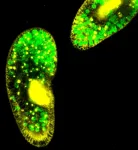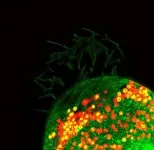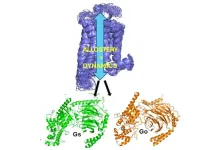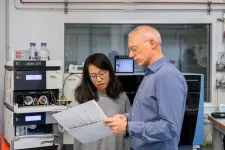(Press-News.org) Hotter conditions prevent two tiny organisms working together for mutual benefit, new research shows.
University of Exeter scientists studied a single-celled organism (Paramecium bursaria) which can absorb and host algae (Chlorella spp).
This pairing is common in freshwater worldwide, and their symbiotic relationship provides benefits including trading of nutrients and protection for the algae.
But when scientists made the water 5°C warmer, the partnership stopped working – and the results suggest the algae may even become parasitic.
The breakdown of such relationships could have a major impact on ecosystems.
“This kind of relationship – called photosymbiosis – is an important part of freshwater and ocean ecosystems,” said Dr Ben Makin, of the Environment and Sustainability Institute on Exeter’s Penryn Campus in Cornwall.
“To illustrate their importance, these relationships provide around half of all marine photosynthesis.
“A well-known example is found in coral reefs – where the reef-building corals host resident photosynthetic partners. In recent years, we have seen many high-profile ‘bleaching’ events – when corals expel these partners, often due to high temperatures, leaving them at risk of stress and mortality.
“That is a short-term, ‘immediate’ reaction to changing conditions, but in this study we wanted to find out the possible evolutionary effects of high temperatures – occurring over multiple generations. Such effects remain virtually unknown, as they are difficult to study in slow-growing organisms.
“The single-celled organisms we chose in our study have short lifespans, so by testing them in sustained high temperatures we were able to examine how they respond over many generations.”
The Paramecium bursaria and Chlorella spp. in the study had been kept in lab conditions at 25°C – a realistic temperature for these species in the environment.
The researchers kept some at 25°C as a control group, while others were exposed to cooling (20°C) or warming (30°C) for 295 days.
“With 5°C of warming – consistent with worst-case climate scenarios by the end of this century – the relationship between these species appears to be fundamentally changed,” Dr Makin said.
“While some algae stayed within host cells, the relationship was strongly degraded in warmer conditions.
“Net photosynthesis and carbon-use efficiency – in effect the amount of energy produced by the algae for its host and the capacity for the association to use that energy to grow – both strongly declined to zero.
“The complete loss of net photosynthesis was a striking result. Alarmingly, this implies the photosynthesis rates provided globally by these associations could be at risk over evolutionary timescales under warming.
“It also means the algae no longer provide the key photosynthetic benefit to their hosts, with the association showing signs of becoming parasitic.”
This is an ‘inversion’ of the mutualistic association these photosymbioses typically form – which means the species no longer receive benefits from one another, and instead partners can exploit or harm the other.
It is hoped that evolution can “rescue” some species, allowing them to adapt quickly enough to rapid environmental changes being caused by humans.
While these species did manage to raise their “growth rate thermal optimum” (their ideal temperature for reproduction), they did not evolve to save their symbiotic relationship.
This type of algae usually relies on organic nitrogen sourced from its host, but in the study more and more of the algae became free living – existing outside the host and now relying on inorganic nitrogen found in the water.
Dr Makin concluded: “Warming has the power to erode these relationships over evolutionary timescales – with serious implications for global, highly productive photosymbiotic associations, like those found in coral reefs.”
The paper, published in the journal Aquatic Biology, is entitled: “One year of warming leads to the total loss of productivity in a widespread photosymbiosis.”
END
Warming stops tiny organisms working together
2024-08-01
ELSE PRESS RELEASES FROM THIS DATE:
Gun permits may be more effective than background checks alone at reducing firearm homicides
2024-08-01
Despite widespread support, laws enforcing universal background checks at the time of firearm purchase may not be enough to move the needle on reducing shooting deaths in the United States. A Tufts University School of Medicine study, published August 1 in the journal JAMA Network Open, reports that states that require gun permits rather than relying solely on universal background checks see firearm homicide rates, on average, 18% lower than states with background check policies alone.
The analysis compared firearm homicide data from the 12 states with universal background check laws but no permit ...
Study finds regular aspirin use associated with greatest reduction in colorectal cancer among those most at risk
2024-08-01
Regular aspirin may help lower risk of colorectal cancer in people with greater lifestyle-related risk factors for the disease, according to a study led by researchers at Mass General Brigham. The study, published in JAMA Oncology, could encourage a more nuanced approach to preventive aspirin use.
“We sought to identify individuals who are more likely to benefit from aspirin to facilitate more personalized prevention strategies,” said co-senior author Andrew Chan, MD, MPH, Director of Epidemiology for the Mass General Cancer Center and gastroenterology Director of the Center for ...
Diagnostic accuracy of an integrated AI tool to estimate gestational age from blind ultrasound sweeps
2024-08-01
About The Study: Between 14 and 27 weeks’ gestation, novice users with no prior training in ultrasonography estimated gestational age as accurately with the low-cost, point-of-care artificial intelligence (AI) tool as credentialed sonographers performing standard biometry on high-specification machines. These findings have immediate implications for obstetrical care in low-resource settings, advancing the World Health Organization goal of ultrasonography estimation of gestational age for all pregnant people.
Quote from corresponding author Jeffrey ...
Aspirin use and incidence of colorectal cancer according to lifestyle risk
2024-08-01
About The Study: Aspirin use was associated with a greater absolute reduction in risk of colorectal cancer among individuals with less healthy lifestyles in this cohort study. The findings of the study suggest that lifestyle risk factors may be useful to identify individuals who may have a more favorable risk-benefit profile for cancer prevention with aspirin.
Corresponding Authors: To contact the corresponding authors, email Andrew T. Chan, MD, MPH (achan@mgh.harvard.edu) and Long H. Nguyen, MD, MS (lnguyen24@mgh.harvard.edu).
To access the embargoed study: Visit our For The Media website at this link https://media.jamanetwork.com/
(doi:10.1001/jamaoncol.2024.2503)
Editor’s ...
State abortion policy and moral distress among clinicians providing abortion after the Dobbs decision
2024-08-01
About The Study: In this purposive national survey study of clinicians providing abortion, moral distress was elevated among all clinicians and more than twice as high among those practicing in states that restrict abortion compared with those in states that protect abortion. The findings suggest that structural changes addressing bans on necessary health care, such as federal protections for abortion, are needed at institutional, state, and federal policy levels to combat widespread moral distress.
Corresponding Author: To contact the corresponding author, ...
Universal background checks, permit requirements, and firearm homicide rates
2024-08-01
About The Study: This cross-sectional study found that universal background checks alone were not associated with firearm homicide rates, but a permit requirement for the purchase and possession of firearms was associated with substantially reduced rates of firearm homicide. The findings suggest that combining universal background checks and permit-to-purchase requirements is an effective strategy for firearm-related fatality reduction.
Corresponding Author: To contact the corresponding author, Michael Siegel, MD, MPH, email mike.siegel@tufts.edu.
To access the embargoed study: Visit our For The Media website at this link https://media.jamanetwork.com/
(doi:10.1001/jamanetworkopen.2024.25025)
Editor’s ...
Joseph Rogers, MD, named to American Board of Internal Medicine’s Cardiovascular Board
2024-08-01
Houston, Texas, July 24, 2024 – The Texas Heart Institute, a globally renowned cardiovascular health center, announced today that Joseph G. Rogers, MD, President and Chief Executive Officer for The Texas Heart Institute and Adjunct Professor in the Division of Cardiology at Duke University, has been appointed by the American Board of Internal Medicine (ABIM) to its Cardiovascular Board for a three-year term beginning July 1, 2024.
“I am honored to have been appointed to this esteemed group ...
Study examines effect of fish oil in older adults’ brains
2024-08-01
A clinical trial at Oregon Health & Science University suggests that a subset of older adults with a genetic predisposition to Alzheimer’s disease may benefit from fish oil supplements.
The study published today in the journal JAMA Network Open.
The results come amid claims that fish oil supplements can improve brain function in people with memory problems. The study found no statistically significant benefit for all older adults in general. However, among those enrolled in the study who also carry a gene associated with Alzheimer’s disease, it showed a reduction in the breakdown of nerve cells in the brain.
The study’s senior co-author from OHSU ...
Conformational dynamics and allostery elucidate how GPCR couple to multiple G-proteins, offering mechanistic insights into coupling-promiscuity and novel drug discovery strategies
2024-08-01
In a groundbreaking study, a multinational research team led by Dr. Adnan Sljoka (RIKEN) and Prof. Akio Kitao (Tokyo Tech), in collaboration with Prof. Scott Prosser (University of Toronto), has carried out experimental and computational studies to elucidate the mechanisms behind G protein selectivity and efficacy in the human adenosine A2A receptor (A2AR). A2AR is a member of major drug targets G protein-coupled receptor (GPCR) superfamily, which engages the G protein and initiates cell signaling, influencing heart health, inflammation, cancer, and brain diseases. Scientists have ...
Proteins as the key to precision medicine: Finding unknown effects of existing drugs
2024-08-01
Fewer side effects, improved chances of healing: the goal of precision medicine is to provide patients with the most individualized treatment possible. This requires a precise understanding of what is happening at the cellular level. For the first time, researchers at the Technical University of Munich (TUM) have now succeeded in mapping the interactions of 144 active substances with around 8,000 proteins. The results could help to identify previously unknown potential benefits of existing drugs.
Practically all drugs either affect, produce or eliminate proteins – or are, in fact, proteins. But what exactly happens when a high or low dose is taken? And what is going ...





